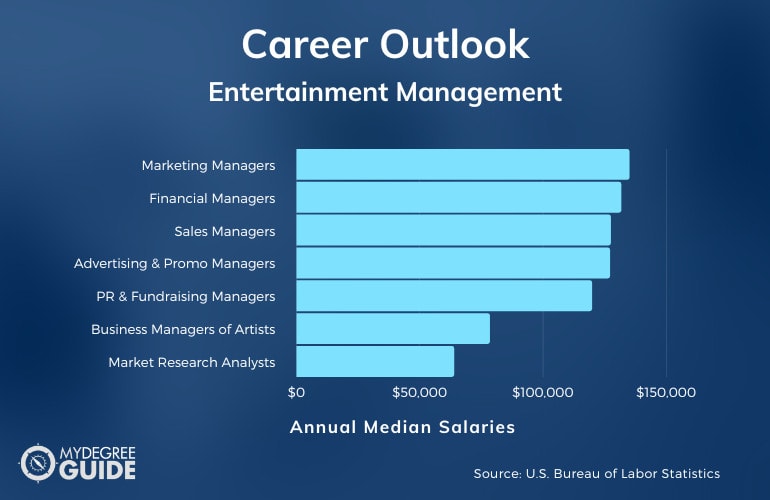An online entertainment management degree program can help you develop your expertise in many areas, including finance, management, entertainment law, and communication.

Courses in this field of study can help you become a proficient problem solver, develop a strong understanding of business economics, and specialize in a specific area of interest.
Editorial Listing ShortCode:
If you are eager to become an integral part of the entertainment industry, earning your online degree in entertainment management can be a strategic way to start.
Online Entertainment Management Degrees

The field of entertainment management centers around promotion and management within all aspects of the entertainment industry. This includes managing venues and artists as well as mediating between corporations and entertainers.
Entertainment managers are expected to have fundamental skills related to traditional finance and marketing in addition to industry-specific skills, like an understanding of pre-production and post-production management.
Entertainment management majors tend to pursue the following careers within the entertainment industry:
- Personal manager
- Event manager
- Public relations manager
- Event coordinator
- Social media manager
- Booking agent
Because a degree in entertainment management prioritizes the business side of the arts and entertainment market, your studies can also help prepare you for roles in business and finance. Some common business careers that entertainment management graduates may pursue are:
- Digital marketer
- Financial analyst
- Marketing manager
- Market research analyst
- Financial manager
One benefit of this degree is its flexibility. While every school will offer a unique curriculum, there are many similarities in course listings across programs.
Editorial Listing ShortCode:
As you work toward earning your degree in entertainment management, some of your courses will likely cover the following topics:
- Entertainment law and ethics
- Consumer behavior in entertainment
- Principles of management
- Accounting
- Sport and entertainment marketing
The curriculum for most programs is intended to equip you with the communication, leadership, and problem-solving skills necessary to oversee entertainment operations.
How do you know if pursuing a four-year degree in entertainment management is right for you? That can depend largely on personal factors, such as career aspirations and personal interests.
It can also help to consider the following questions:
- Are you interested in the entertainment industry?
- What are your long-term career goals and aspirations?
- What are your communication and leadership strengths?
- Are you curious about the business side of the entertainment industry?
Answering these questions can be a helpful way to start the application process and begin searching for schools that offer entertainment management degree programs.
Entertainment Management Careers & Salaries

There are many leadership roles within the entertainment management industry. According to the Bureau of Labor Statistics, the following careers can benefit from the skill sets learned in an entertainment management degree program.
| Careers | Annual Median Salaries |
| Marketing Managers | $135,030 |
| Financial Managers | $131,710 |
| Sales Managers | $127,490 |
| Advertising and Promotions Managers |
$127,150 |
| Public Relations and Fundraising Managers | $119,860 |
| Agents and Business Managers of Artists, Performers, and Athletes | $78,410 |
| Market Research Analysts | $63,920 |
| Public Relations Specialists | $62,800 |
| Fundraisers | $60,660 |
| Meeting, Convention, and Event Planners | $49,470 |
The entertainment industry is a multifaceted entity that encompasses many different roles. Additionally, there may be opportunities for advancement as you continue to work in the field.
Although it may be tempting to equate an entertainment business degree with a high salary or specific title, professional opportunities and pay will vary with experience and between geographic locations.
Entertainment Management Curriculum & Courses

Each entertainment management business degree online program offers a unique curriculum, but here are some common courses found in this type of program:
- Entertainment Law and Ethics: This course explores the legal and ethical issues within entertainment, focusing on topics such as contracts, copyrights, unions, and intellectual property.
- Financial Management: This course can help you learn how to determine the costs involved in successfully running a business.
- Organizational Management: This course covers the fundamentals of managing an organization and the details of planning, leading, and organizing a business.
- Public and Media Relations: This course discusses the fundamentals of public relations, including persuasive communication and crisis management.
- Entertainment Promotion and Marketing: This introductory course covers the fundamentals of entertainment management, including finance, accounting, and marketing skills specific to the industry.
- Research Design and Methods: This class can help you learn how to design effective research projects and become acquainted with the various tools that can help you conduct your research.
- Facilities and Events: This course can give you the opportunity to explore the designs and structures of different facilities and help you develop the skills necessary to plan and organize a large event.
- Digital and Social Media Communication: This class covers the fundamentals of communication through various digital and social media channels, such as emails, chats, and social platforms.
- Corporate Partnerships and Community Engagement: This course covers how to create and plan for successful corporate partnerships as well as how to promote healthy relationships between the community and stakeholders.
- Consumer Behavior in Entertainment: This class can help you learn how to analyze data to determine what consumers want, including the prices they are willing to pay and the best way to advertise and market products and events.
As an entertainment management major, your courses will likely cover aspects of business, finance, marketing, and design in relation to the entertainment industry.
Admissions Requirements

Admissions requirements tend to vary between schools, but these are some common requirements:
- SAT or ACT scores (only when required)
- Official transcripts
- Letters of recommendation
- Personal essay
The purpose of an application is to give admissions teams an idea of your character, achievements, and goals. While your academic record and standardized test scores play a part, you can also use your personal essay and letters of recommendation to highlight your strengths and tell your story.
Accreditation

The accreditation process determines whether a school provides high-quality educational programs and resources. During this review process, an external agency conducts an examination of a school’s curriculum, facilities, staff, and funds to ensure that they meet high-quality standards.
Employers tend to prefer candidates with accredited degrees since they can trust that their training was up to industry standards. Additionally, federal financial aid programs only grant loans to students who attend an accredited college or university.
Editorial Listing ShortCode:
As you search for colleges, you can verify whether your prospective schools are regionally accredited by visiting the US Department of Education’s website.
Financial Aid and Scholarships

Many college-bound students have questions about available financial aid and scholarship opportunities. One of the most commonly pursued types of financial aid is federal aid.
You can find out how much need-based aid you are eligible for by filling out the Free Application for Federal Student Aid (FAFSA). In addition to federal aid, you may qualify for tuition reimbursement through an employer. Many companies have tuition benefits for their employees, though this is unique to each workplace.
Most schools also offer scholarship opportunities to current and future students. Most scholarships have application requirements, such as a minimum GPA. You can research the available financial aid options at your schools of interest for specific information.
Arts and Entertainment Management Professional Organizations

Professional organizations provide a way to keep up with the latest developments in your field while developing a strong network of peers.
- Association of Talent Agents (ATA): An organization dedicated to talent agents, the ATA focuses on providing support and advocating for legislative changes in the field of talent agencies.
- Events Industry Council (EIC): The EIC represents individuals, firms, and properties in the events industry.
- International Artist Managers’ Association (IAMA): Comprising classical music artist management, the IAMA works to elevate professional business standards in the music industry.
Joining a professional organization can help you progress toward your career goals and discover exciting job opportunities.
What Is an Entertainment Management Degree?

An entertainment management degree is focused on the business side of the entertainment industry. It includes an in-depth look at the financial and marketing components of entertainment management.
During your program, you may have a chance to focus on a particular area of study, such as dance, theater, or media studies. The opportunity to specialize in a specific field can help you prepare for the type of career that you are passionate about.
In addition to developing finance and marketing skills, you can also learn the fundamentals of leadership and communication.
What Can You Do with a Major in Entertainment Management?

An entertainment business management degree program can give you the opportunity to develop practical skills, like accounting, as well as industry-specific skills, like event coordination. This versatile degree can help prepare you for a diverse range of professional roles.
Entertainment management graduates often go on to become talent agents, fundraisers, and public relations specialists. If you are interested in a career outside of the entertainment industry, you might consider a job in the finance or marketing sectors.
Editorial Listing ShortCode:
An understanding of your long-term goals can aid you as you make a career decision. It’s helpful to remember, though, that earning your degree does not guarantee a specific title.
How Long Does It Take to Get an Online Entertainment Management Degree?
Exact program lengths tend to vary between schools, although many have similar credit hour requirements. If you attend school full-time and follow a traditional, 16 week semester, it usually takes 4 years to complete a bachelor’s degree online.
If you follow an 8 week semester and stay enrolled year-round, including over the summer, you can potentially finish in a shorter amount of time. External factors, such as employment status, may contribute to your decision to attend school part-time or full-time.
What Jobs Can You Get with an Entertainment Management Degree?

Many graduates with entertainment management degrees are employed as marketing managers, talent agents, public relations specialists, or financial managers. While earning your bachelor’s degree in entertainment management does not guarantee a certain position, it does have the potential to open up many career opportunities for you.
Graduates often use their management, communication, and critical thinking skills to work their way up to leadership roles within the entertainment management industry. The many skill sets you can develop during your undergraduate program can also be applied outside of the entertainment industry.
Is an Entertainment Management Bachelor Degree Worth It?

Yes, an entertainment management bachelor degree is worth it for many students. Many careers associated with a degree in entertainment management have a higher projected employment growth than the national average for all other occupations. For instance, the Bureau of Labor Statistics projects 46% job growth for agents and business managers of artists, performers, and athletes over the next decade.
Employment for management occupations in general is projected to grow 9% over the same period, which is about as fast as the average growth for all occupations (Bureau of Labor Statistics).
Editorial Listing ShortCode:
An entertainment management program can help you develop general and industry-specific skills, such as digital communication and event coordination. These versatile skills can help you qualify for a diverse range of professional opportunities across industries and fields.
Universities Offering Online Bachelors in Entertainment Management Degree Programs
Methodology: The following school list is in alphabetical order. To be included, a college or university must be regionally accredited and offer degree programs online or in a hybrid format.

Biola University offers an online program for a B.S. in Entertainment Business. The program is designed to help students cultivate a biblical worldview.
Courses are asynchronous and can be taken in any order. They include Content Creation and Strategy in a Digital Age, Entertainment Law, Entertainment and Production Financing, Media Distribution – Domestic and Global, and more.
Biola University is accredited by the WASC Senior College and University Commission.

Florida International University offers a Bachelor of Science in Hospitality Management – Entertainment Management. The program is fully online and includes both academic instruction and an internship in which students can gain hands-on experience.
Courses include Microeconomics, Macroeconomics, Entertainment Law, Entertainment Tour Management, Entertainment Transactions for Hospitality Facilities, and more.
Florida International University is accredited by the Southern Association of Colleges and Schools Commission on Colleges.

Grand Canyon University offers a Bachelor of Science in Sports and Entertainment Management. Courses include Business Statistics, Essentials of Economics, Ethical and Legal Issues in Business, Organizational Behavior and Management, Sports Law, and more.
Graduates often become agents, talent managers, or marketing coordinators or work in similar roles.
Grand Canyon University is accredited by the Higher Learning Commission.

Johnson & Wales University offers a Bachelor of Science in Sports, Entertainment, and Event Management. The program is career-focused and 100% online.
The average class size is fifteen students, and courses are just 8 weeks long. They include Professional Sports Management, Sports and Entertainment Marketing, Concert and Event Production, and more.
JWU is accredited by the New England Commission of Higher Education.

Lipscomb University offers online programs for a Bachelor of Arts, a Bachelor of Science, and a Bachelor of Professional Studies in Hospitality Management. These programs cover topics such as hospitality and tourism, hotel and resort management, entertainment management, and more. They are designed to give students the flexibility needed to work at their own pace.
Lipscomb University is accredited by the Southern Association of Colleges and Schools Commission on Colleges.

Ohio University offers a Bachelor of Science in Business. There are 5 specializations to choose from: Marketing, Human Resources, Supply Chain Management, Technical Project Management, and FEEM (Festival, Event, and Entertainment Management).
Ohio University is committed to empowering students and preparing them to continuously adapt.
Ohio University is accredited by the Higher Learning Commission.

Purdue University offers an online program for a Bachelor of Science in Business Administration. There are sixteen concentration areas available, including Sport Entertainment Management. Courses are each just 10 weeks long. There is also an accelerated bachelor’s to master’s option to shorten the path to an MBA.
There are multiple start dates offered each year.
Purdue University is accredited by the Higher Learning Commission of the North Central Association of Colleges and Schools.

Regent University offers a B.A. in Communication Studies – Theater. The degree can be earned on campus or online. The curriculum is anchored in Christian principles and values. Online classes are just 8 weeks long, and there are multiple start dates each year.
Courses include Introduction to Theatre, Play Analysis, Theatre History I, and more.
Regent University is accredited by the Southern Association of Colleges and Schools Commission on Colleges.

St. Petersburg College offers a major in Hospitality Management – Entertainment Management. Students in the program are expected to complete an internship and study topics such as finance, business management, logistics, accounting, operations, and more.
Graduates often go on to work in theme parks, live music venues, cinemas, and similar settings.
SPC is accredited by the Southern Association of Colleges and Schools Commission on Colleges.

The University of Arizona offers a Bachelor of General Studies in Arts, Media, and Entertainment. Course options include Rock and American Popular Music, Jazz History, Literature and Film, Hip-Hop Cinema, and more. Graduates often work in print media, film and television, public relations, and marketing.
The University of Arizona is accredited by the Higher Learning Commission.
Getting Your Entertainment Management Degree Online

Earning a degree in entertainment management can be a beneficial choice for anyone who has a flair for business and a strong drive to develop their marketing and communication skills.
Many graduates go on to pursue leadership roles across a range of fields, both in the public and private sectors. It can be helpful to create a list of your professional interests and long-term career goals. Then you can begin researching online entertainment management programs with your personal criteria in mind.
For students interested in continuing their educations in the field, a growing number of universities offer online master’s in entertainment management degree programs.
The sooner you begin exploring accredited schools, the sooner you can find entertainment management online degrees that best fit your needs.

